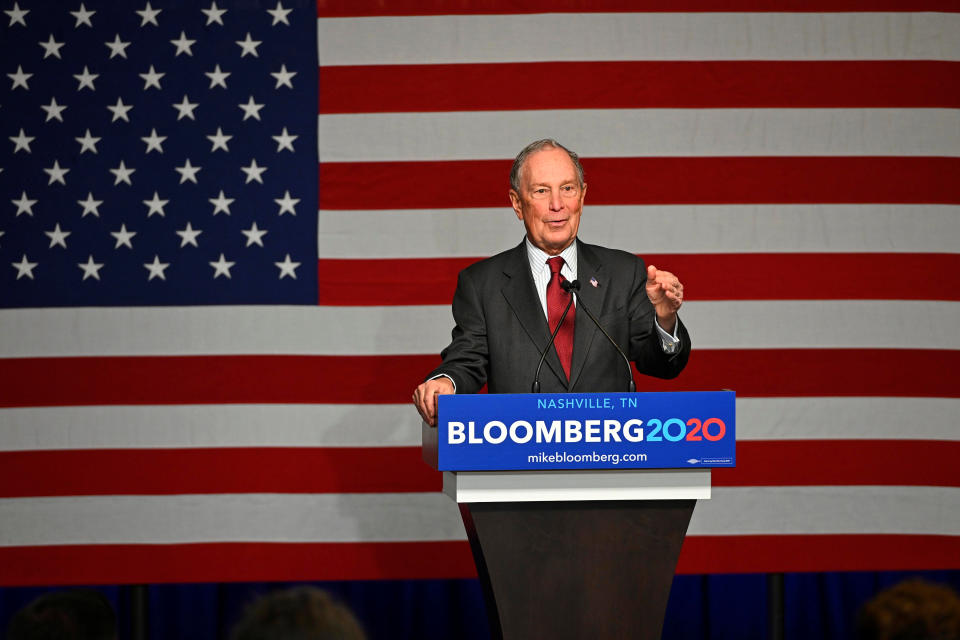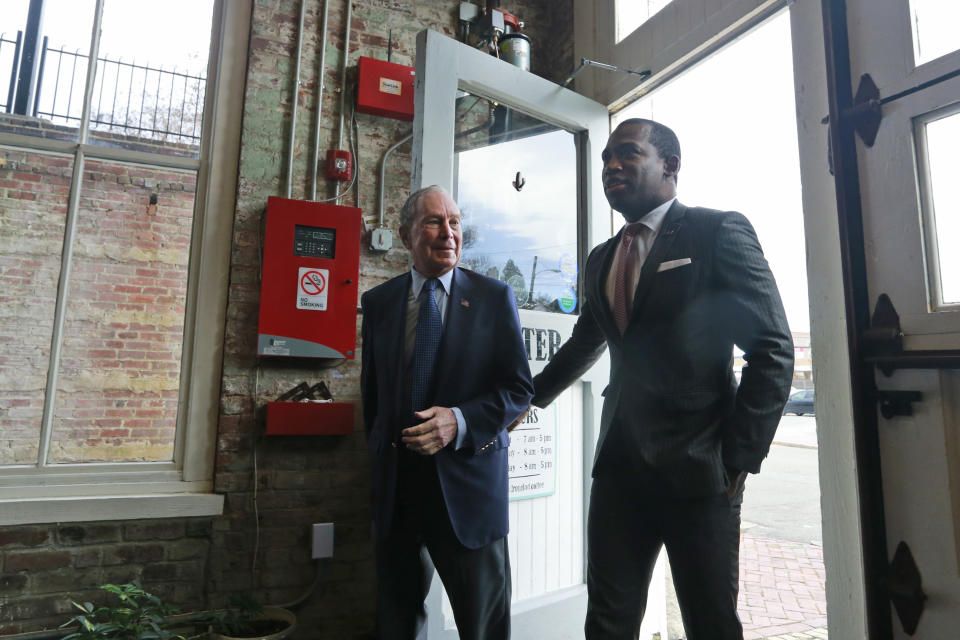Here's Michael Bloomberg's new 'All-In' economic agenda
Mike Bloomberg's campaign is very quickly playing catch-up with the rest of the Democratic field.
The former New York City mayor’s campaign went from zero staff just a few months ago to over 500 today across 30 states. It became the highest spending campaign of the 2020 cycle after just a few weeks on the air.
And it's the same with Bloomberg’s policy rollouts: on Wednesday his campaign released the first part of its “All-In Economy” agenda.
The plan is a grab bag of proposals to raise the minimum wage, ensure gig workers have collective bargaining rights, and give more help to start-ups and small businesses.
Bloomberg’s agenda contains measures aimed at both urban and rural areas as well as formerly industrial communities. Mayor Bloomberg himself is traveling to Illinois and Minnesota and Ohio throughout the day Wednesday.
?"We need to elect someone who can actually deliver real change – not just talk about it – and create more good jobs, with good salaries, all across America. That’s what I’ve done running my company. It's what I did leading the largest city in the country. And it's what I’ll do if I have the honor of serving as the next President of the United States,” said Bloomberg in a statement.
Bloomberg released his slew of initiatives but provided few details about how he would pay for them.
President Trump has made the strong economy a focal point of his re-election bid. But despite the low unemployment rate and stock market at record highs, Bloomberg said Trump has “over-promised and under-delivered” on his promises to create jobs.

“Americans are working harder and earning less under Trump. Mike will change that,” the campaign said in a factsheet.
Increase minimum wage to $15 an hour
The billionaire said if he becomes president he would “enhance the Earned Income Tax Credit, pay it monthly and pay more where it’s most needed.” He would also work to increase the minimum wage to $15 an hour and index it to inflation. According to the proposal, Bloomberg would support legislation to expand access to child care and institute a federal standard for paid family leave.
The minimum wage issue has been a key one that Bloomberg’s rivals have talking about since the race began. The fight for $15 movement has gained the support of nearly the every Democratic contender as it pushes for a national $15-an-hour minimum wage.
“Mike is really focused on making work pay” says Sam Liccardo, Mayor of San Jose, Calif., and a Bloomberg 2020 CA co-chair, who appeared on Yahoo Finance’s “On the Move” to discuss the plan. While he acknowledged that many of the ideas in Bloomberg’s plan have been part of the Democratic primary for months, Liccardo noted as a point of distinction that “Mike is really focused on research and development” to find solutions in places across the country where people have been left behind.
The Bloomberg plan would also grant all workers — including gig, contract and franchise employees — the right to bargain collectively. Bloomberg also calls for limits on controversial mandatory arbitration agreements and non-compete clauses. He also wants to outlaw “no-poaching” agreements, in which franchisees agree not to hire each others’ workers.
Bloomberg said he would encourage businesses to locate and hire people in distressed communities through a “place-based EITC that lowers costs for employers.”

His plan would also expand the Trade Adjustment Assistance program, by covering workers affected by automation and the transition to a green economy — in addition to workers affected by foreign competition.
Other Democratic candidates have pitched their ideas to protect workers whose jobs could be at risk due to automation. Sen. Elizabeth Warren (D-MA) wants more workers to have a voice on corporate boards; entrepreneur Andrew Yang is promising universal basic income; and Sen. Bernie Sanders (I-VT) says his federal job guarantee is the answer.
Modernize education, job training
Bloomberg’s proposal also calls for an increased focus on job training and education. Bloomberg argues some systems and programs designed to help people learn new skills are outdated. He calls the current approach “fundamentally ill-equipped to meet rapidly changing workforce and employee needs.”
Bloomberg said addressing this issue would be his (unnamed) vice president’s top priority.
“This plan will invest in states, community and technical colleges and others to work with employers to build and strengthen career-training systems and programs providing skills and credentials employers identify as priorities for hiring for good jobs,” the campaign said.
Under the plan, Bloomberg would release restrictions on federal Pell grant money to pay for short-term training and allow for people in prison to access those funds. Adults receiving Unemployment Insurance could participate in certain training programs without risk of losing their benefits.
Bloomberg said he would streamline existing programs and agencies to “ensure effective oversight” of workforce training programs. The proposal aims to modernize work-study programs and provide additional grants and funding for apprenticeships. By 2030, Bloomberg hopes to have one million students earning apprenticeship degrees and quality credentials each year.
Other candidates have released ideas on the issue of job training. Joe Biden –- when he was Vice President – actually led an “across-the-board reform of America's training programs” and on his campaign website he touts a plan for “education beyond high school.”
Invest in local communities
Bloomberg’s proposal calls for “major investments” in research and development to help cities grow. Those investments would be driven by partnerships with existing businesses and universities. He said there would be investments in physical infrastructure as well.
“Economic growth is concentrated in a limited number of cities, while people are struggling, and former manufacturing and agricultural hubs are shuttering,” argues Bloomberg.
The former mayor wants to give more help to start-ups and small businesses. Under his plan, he would establish Business Resource Centers around the country, to help entrepreneurs access capital, navigate bureaucracy and take advantage of federal programs. He said he would also increase funding and staffing at the Small Business Administration.
Other candidates have also discussed measures to get more capitol to small business owners. Warren, for example, has a proposed a Small Business Equity Fund to help entrepreneurs of color.
Bloomberg’s jobs plan comes after one of his first policy rollouts in December – health care centered around a "Medicare-like public option." Biden and Pete Buttigieg have also advocated for a public option.
The Bloomberg campaign says he will introduce additional economic plans in the coming weeks — including proposals to upgrade infrastructure, increase R&D spending to transition to a clean-energy economy and increase investment in disadvantaged communities.
Jessica Smith is a reporter for Yahoo Finance based in Washington, D.C. Follow her on Twitter at @JessicaASmith8. Ben Werschkul is the DC producer for Yahoo Finance.
Read more:
Senator slams 'fake food fad,' introduces bill to crack down on fake meat labeling
Lawmakers want to penalize companies for ‘outrageous’ CEO pay
GOP congressman: Americans, lawmakers are 'waking up' to China threat
Follow Yahoo Finance on Twitter, Facebook, Instagram, Flipboard, LinkedIn, YouTube, and reddit.